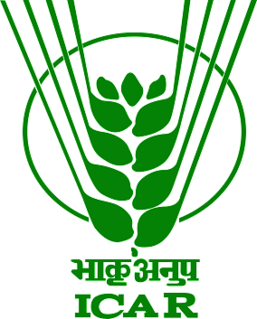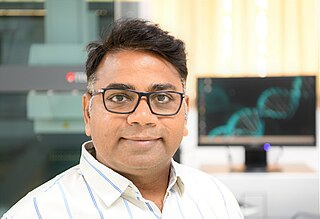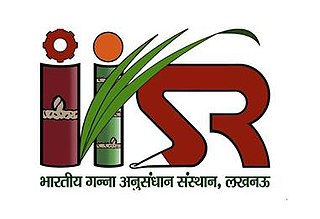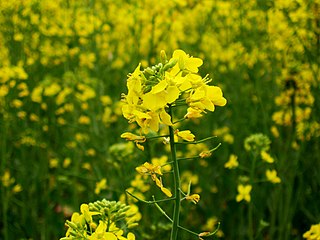Related Research Articles

The Indian Council of Agricultural Research (ICAR) is an autonomous body responsible for co-ordinating agricultural education and research in India. It reports to the Department of Agricultural Research and Education, Ministry of Agriculture. The Union Minister of Agriculture serves as its president. It is the largest network of agricultural research and education institutes in the world.
Bt cotton is a genetically modified pest resistant plant cotton variety, which produces an insecticide to combat bollworm.
Chandrakant T. Patel, was a cotton scientist, who developed the first commercial cotton hybrid, known as Hybrid-4 (Sankar-4), in 1970, which was later cultivated commercially in the states of Gujarat and Maharashtra.
Bhimareddy Hanumareddy Katarki is an Indian agricultural scientist specializing in cotton. During the 1970s, he was inspired by the success of Hybrid-4, Cotton by Dr. C. T. Patel, of Surat Research Station. Dr. Katarki also made a groundbreaking discovery of Varalaxmi, and DCH-32 Cotton varieties, at the Dharwad Agricultural University (Karnataka).
Nimbkar Agricultural Research Institute (NARI) is a non-governmental organisation and non-profit research and development institute in Tambmal, Phaltan, Maharashtra, India. The institute undertakes research and development in the fields of agriculture, renewable energy, animal husbandry and sustainable development. The institute was founded in 1968 by Shri B. V. Nimbkar, who remained its president until 1990. Dr.Anil K. Rajvanshi is currently the director of the institute whereas Dr. Nandini Nimbkar is the president.
The genetically modified brinjal is a suite of transgenic brinjals created by inserting a crystal protein gene (Cry1Ac) from the soil bacterium Bacillus thuringiensis into the genome of various brinjal cultivars. The insertion of the gene, along with other genetic elements such as promoters, terminators and an antibiotic resistance marker gene into the brinjal plant is accomplished using Agrobacterium-mediated genetic transformation. The Bt brinjal has been developed to give resistance against lepidopteron insects, in particular the Brinjal Fruit and Shoot Borer (FSB) by forming pores in the digestive system. Mahyco, an Indian seed company based in Jalna, Maharashtra, has developed the Bt brinjal.

G. V. Chalam, also known as Guduru Venkata Chalam (1909–1967), was an Indian activist and agricultural scientist who received the Padma Shri in 1967.
Vaidhyanathaswamy Santhanam was an Indian cotton scientist who worked for the Food and Agriculture Organization of the United Nations as a long term resident expert for cotton and project leader in Myanmar. He had served as a short term consultant to Vietnam as well. He was chairman of the expert review team of the Southern India Mills Cotton Development and Research Association from November 2009 to March 2010. He was also the author/co-author of over 110 publications, including books and book chapters on cotton.

Rajeev Kumar Varshney is an agricultural scientist, specializing in genomics, genetics, molecular breeding and capacity building in developing countries. Varsheny is currently the Research Program Director- Genetic Gains that includes several units viz. Genomics & Trait Discovery, Forward Breeding, Pre-Breeding, Cell, Molecular Biology & Genetic Engineering, Seed Systems, Biotechnology- ESA, Sequencing and Informatics Services Unit, and Genebank ; and Director, Center of Excellence in Genomics & Systems Biology at the International Crops Research Institute for the Semi-Arid Tropics (ICRISAT), a global agricultural research institute. He holds Adjunct/Honorary/Visiting Professor positions at 10 academic institutions in Australia, China, Ghana, Hong Kong and India, including Murdoch University, The University of Western Australia, University of Queensland, West Africa Centre for Crop Improvement, University of Hyderabad, Chaudhary Charan Singh University and Professor Jayashankar Telangana State Agricultural University.
P. Ananda Kumar is an Indian plant molecular biologist and biotechnologist.
Regional Agricultural Research Station, Pattambi is a research Station under the Central Zone of Kerala Agricultural University at Pattambi in Palakkad district of Kerala, India.

The Indian Institute of Horticultural Research (IIHR) is an autonomous organization acting as a nodal agency for basic, strategic, anticipatory and applied research on various aspects of horticulture such as fruits, vegetable, ornamental, medicinal and aromatic plants and mushrooms in India. The institute has its headquarters in Bengaluru, Karnataka, India and is a subsidiary of Indian Council of Agricultural Research (ICAR), New Delhi, under the Ministry of Agriculture, India.

The Indian Institute of Sugarcane Research is an autonomous institute of higher learning, under the umbrella of Indian Council of Agricultural Research (ICAR) by the Ministry of Agriculture, Government of India for advanced research in sugar cane agriculture. The Institute is located on Raibareli Road, Dilkusha in Lucknow, Uttar Pradesh, India. While, The Central Sugarcane Research Institute established in 1912 is located in Coimbatore, Tamil Nadu, India. It works also under the Indian Council of Agricultural Research.
Ebrahimali Abubacker Siddiq is an Indian agricultural scientist, whose research in genetics and plant breeding is reported to have assisted in the development of various high-yielding rice varieties such as dwarf basmati and hybrid rice. The government of India honoured Siddiq in 2011 with the fourth-highest civilian award of Padma Shri.
Krishnaswamy Ramiah, was an Indian agricultural scientist, geneticist, parliamentarian and the founder director of Central Rice Research Institute (CRRI), Cuttack, credited with introducing systematic hybridisation programmes in rice breeding in India. The Government of India honoured him in 1957, with the award of Padma Shri, the fourth highest Indian civilian award for his services to the nation and followed it up with the third highest civilian honour of the Padma Bhushan in 1970.
Mangina Venkateswara Rao was an Indian agricultural scientist, plant breeder, geneticist and the chairman of the Agri Biotech Foundation. He was a former Vice Chancellor of the Acharya N. G. Ranga Agricultural University and a former Deputy Director of the Indian Council of Agricultural Research (ICAR). Rao, a recipient of the Norman Borlaug Award, was awarded the fourth highest civilian award of the Padma Shri, by the Government of India, in 1999.

Kaderbad Ravindranath is an Indian agricultural research scientist and cotton breeder. In 2015, he received the Life Time Achievement Award for his contributions to the cotton research.
Maharashtra Hybrid Seeds Co. (Mahyco) is an agricultural company based in India. It is one of the country's major producers of seed. As of 2015, the company was also active in Vietnam, Indonesia, Philippines and Bangladesh, and planned expansion to Africa. The company produces seeds for cotton, wheat, rice, sorghum, pearl millet, maize oilseeds and vegetables crops. Through a joint venture with Monsanto named Mahyco Monsanto Biotech, Mahyco sublicenses Bt cotton technology in India. The Indian government has maintained price controls on Bt cotton seeds since at least 2011.
Neelamraju Ganga Prasada Rao was an Indian geneticist and plant breeder, known for his efforts in developing hybrid varieties of sorghum, which earned him the moniker, the Father of Hybrid Sorghum. He was the vice chancellor of Vasantrao Naik Marathwada Agricultural University and chaired the Agricultural Scientists Recruitment Board of the Indian Council of Agricultural Research. He was a recipient of several national honors including Rafi Ahmed Kidwai Award and the VASVIK Industrial Research Award. The Council of Scientific and Industrial Research, the apex agency of the Government of India for scientific research, awarded him the Shanti Swarup Bhatnagar Prize for Science and Technology, one of the highest Indian science awards, in 1966, for his contributions to biological sciences.

Dhara Mustard Hybrid-11, otherwise known as DMH - 11, is a genetically modified hybrid variety of the mustard species Brassica juncea. It was developed by Professor Deepak Pental from the University of Delhi, with the aim of reducing India's demand for edible oil imports. DMH - 11 was created through transgenic technology, primarily involving the Bar, Barnase and Barstar gene system. The Barnase gene confers male sterility, while the Barstar gene restores DMH - 11's ability to produce fertile seeds. The insertion of the third gene Bar, enables DMH - 11 to produce phosphinothricin-N- acetyl-transferase, the enzyme responsible for Glufosinate resistance. This hybrid mustard variety has come under intense public scrutiny, mainly due to concerns regarding DMH - 11's potential to adversely affect the environment as well as consumer health. DMH - 11 was found not to pose any food allergy risks, and has demonstrated increased yields over existing mustard varieties. Conflicting details and results regarding the field trials and safety evaluations conducted on DMH - 11 have delayed its approval for commercial cropping.
References
- ↑ "Campaign against Bt cotton is motivated, says research scientist". The Hindu . April 16, 2007. Archived from the original on May 25, 2007. Retrieved 5 December 2010.
- ↑ Speciality Cotton (Organic, Suvin and ELS) (PDF). Ministry of Textile - Government of India. Retrieved December 5, 2010.
- ↑ Bureau (April 13, 2007). "Public-private partnership may help reach seed tech to farmers". Coimbatore: Business Daily from THE HINDU group of publications. Retrieved 5 December 2010.
- ↑ "Cultivating ryot amiability". biospectrumindia.com. July 11, 2008. Retrieved 5 December 2010.